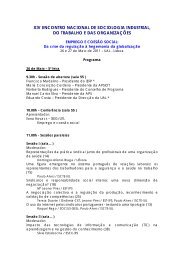Web-based Learning Solutions for Communities of Practice
Web-based Learning Solutions for Communities of Practice
Web-based Learning Solutions for Communities of Practice
Create successful ePaper yourself
Turn your PDF publications into a flip-book with our unique Google optimized e-Paper software.
Individual <strong>Learning</strong> and Emotional Characteristics in <strong>Web</strong>-<strong>based</strong> <strong>Communities</strong> <strong>of</strong> <strong>Practice</strong><br />
Felder, R. M., & Silverman, L. K. (1988). <strong>Learning</strong><br />
and teaching styles in engineering education.<br />
English Education, 78, 674–681.<br />
Germanakos, P., Tsianos, N., Lekkas, Z., Mourlas,<br />
C., Belk, M., & Samaras, G. (2007). An adaptive<strong>Web</strong><br />
system <strong>for</strong> integrating human factors in<br />
personalization <strong>of</strong> <strong>Web</strong> content. In Proceedings <strong>of</strong><br />
the 11 th International Conference on User Modeling<br />
(UM 2007), Corfu, Greece.<br />
Germanakos, P., Tsianos, N., Mourlas, C., &<br />
Samaras, G. (2005). New fundamental pr<strong>of</strong>iling<br />
characteristics <strong>for</strong> designing adaptive <strong>Web</strong>-<strong>based</strong><br />
educational systems. In Proceedings <strong>of</strong> the IADIS<br />
International Conference on Cognition and Exploratory<br />
<strong>Learning</strong> in Digital Age (CELDA2005),<br />
Porto, Portugal (pp. 10-17).<br />
Gilbert, J. E., & Han, C. Y. (1999). Arthur: Adapting<br />
instruction to accommodate learning style. In<br />
Proceedings <strong>of</strong> the <strong>Web</strong>Net 99 World Conference<br />
on the WWW and Internet (pp. 433-438).<br />
Goleman, D. (1995). Emotional intelligence: Why<br />
it can matter more than IQ. New York: Bantam<br />
Books.<br />
Goleman, D. (1998). Working with emotional<br />
intelligence. New York: Bantam.<br />
Gordon, D., & Bull, G. (2004). The nexus explored:<br />
A generalised model <strong>of</strong> learning styles. In<br />
Proceedings <strong>of</strong> the 15 th International Conference<br />
<strong>of</strong> Society <strong>of</strong> In<strong>for</strong>mation Technology & Teacher<br />
Education, Atlanta, Georgia, USA.<br />
Graff, M. (2003). <strong>Learning</strong> from <strong>Web</strong>-<strong>based</strong><br />
instructional systems and cognitive style. British<br />
Journal <strong>of</strong> Educational Technology, 34(4),<br />
407–418. doi:10.1111/1467-8535.00338<br />
Gregorc, A. F. (1982). An adult’s guide to style.<br />
Maynard, MA: Gabriel Systems.<br />
Honey, P., & Mum<strong>for</strong>d, A. (1986). A manual <strong>of</strong><br />
learning styles. Maidenhead, UK: Peter Honey.<br />
John, D., & Boucouvalas, A. C. (2002). Multimedia<br />
tasks and user cognitive style. In Proceedings <strong>of</strong><br />
the International Symposium on CSNDSP 2002.<br />
Kim, J., & Gorman, J. (2005). The psychobiology<br />
<strong>of</strong> anxiety. Clinical Neuroscience Research, 4,<br />
335–347. doi:10.1016/j.cnr.2005.03.008<br />
Kolb, A. Y., & Kolb, D. A. (2005). The Kolb<br />
learning style inventory – version 3.1 2005 technical<br />
specifications. Experience Based <strong>Learning</strong><br />
Systems Inc.<br />
Kort, B., & Reilly, R. (2002). Analytical models <strong>of</strong><br />
emotions, learning and relationships: Towards an<br />
affect-sensitive cognitive machine. In Proceedings<br />
<strong>of</strong> the Conference on Virtual Worlds and Simulation<br />
(VWSim 2002).<br />
Langley, A. (2000). Emotional intelligence - a<br />
new evaluation <strong>for</strong> management development?<br />
Career Development International, 5, 177–183.<br />
doi:10.1108/13620430010371937<br />
Lekkas, Z., Tsianos, N., Germanakos, P., & Mourlas,<br />
C. (2007). Integrating cognitive and emotional<br />
parameters into designing adaptive hypermedia<br />
environments. In Proceedings <strong>of</strong> the Second European<br />
Cognitive Science Conference (EuroCog-<br />
Sci’07), Delphi, Hellas, (pp. 705-709).<br />
Markham, S. (2004). <strong>Learning</strong> styles measurement:<br />
A cause <strong>for</strong> concern (Tech. Rep.). Computing<br />
Educational Research Group.<br />
McCarthy, B. (1990). Using the 4MAT system<br />
to bring learning styles to schools. Educational<br />
Leadership, 48(2), 31–37.<br />
Myers-Briggs, I., McCaulley, M. H., Quenk, N. L.,<br />
& Hammer, A. L. (1998). MBTI manual (A guide<br />
to the development and use <strong>of</strong> the Myers Briggs<br />
type indicator). Mountain View, CA: Consulting<br />
Psychologists Press.<br />
125



